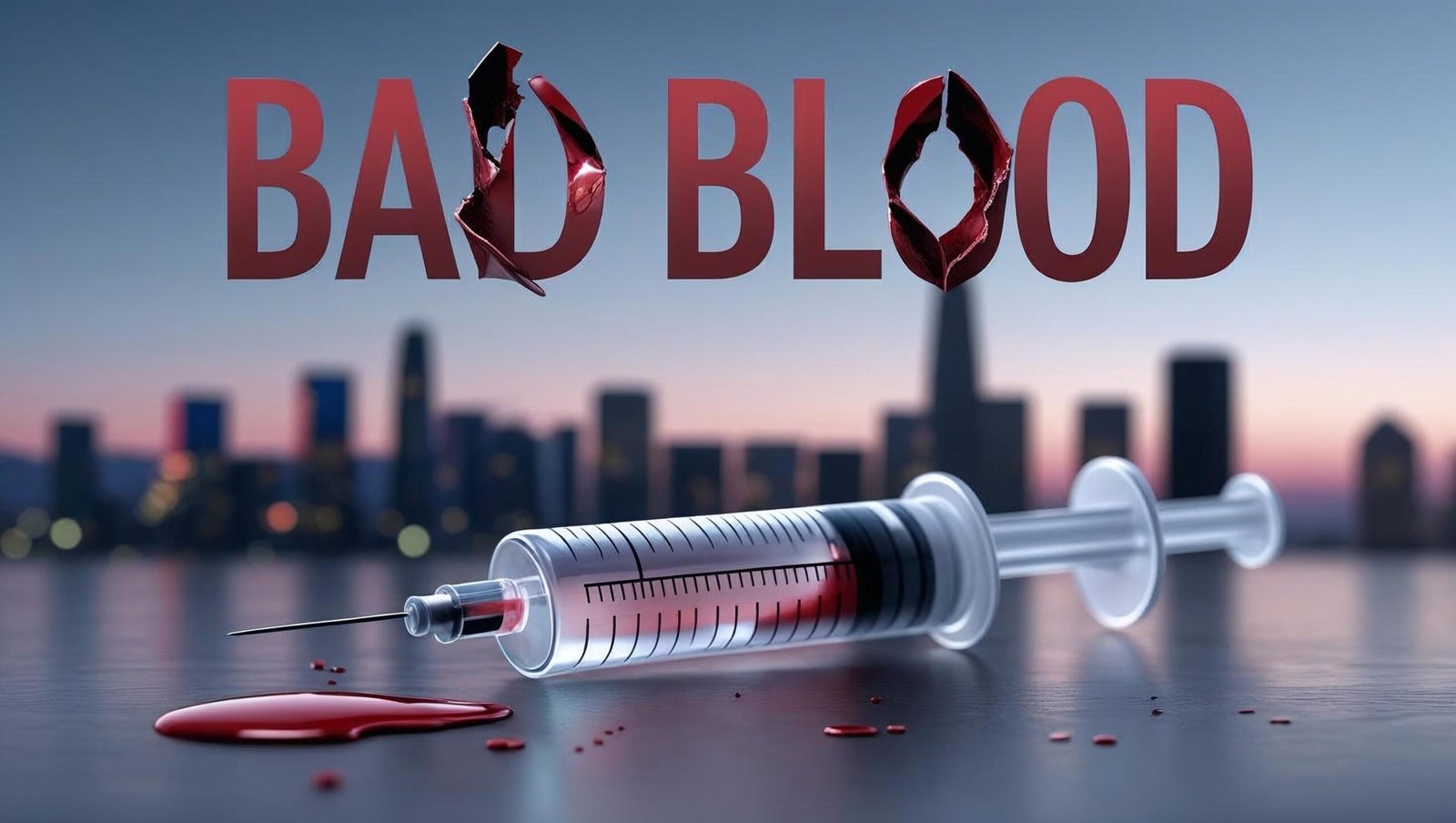Bad Blood Summary: 13 Shocking Lessons from John Carreyrou’s Exposé of Theranos
Introduction
The bad blood summary is more than a review of John Carreyrou’s bestselling book Bad Blood: Secrets and Lies in a Silicon Valley Startup. It is a chilling reminder of how unchecked ambition, deception, and blind faith in innovation can create one of the most shocking scandals in modern corporate history. Published in 2018, the book exposes the dramatic rise and catastrophic fall of Theranos, a company once valued at $9 billion, led by its enigmatic founder Elizabeth Holmes.
This bad blood summary takes you deep into the world of Silicon Valley, where Holmes promised to revolutionize blood testing with just a finger-prick sample. Investors, media outlets, and even government officials were swept away by her charisma and vision. Yet, beneath the glossy surface, Carreyrou uncovers the lies, manipulation, and cover-ups that threatened not just financial stability but also human lives.
In this detailed bad blood summary, we will explore 13 shocking lessons from Carreyrou’s exposé that hold relevance for entrepreneurs, investors, healthcare professionals, and everyday readers who want to understand how truth eventually triumphs over deception.

1. The Power of Vision Can Blind Reality
The bad blood summary begins with the irresistible vision of Elizabeth Holmes. She wanted to democratize healthcare by making blood tests faster, cheaper, and accessible. The promise of saving lives with a single drop of blood sounded revolutionary. Yet, this vision blinded investors, employees, and the public to the lack of scientific proof behind the claims.
Lesson: A powerful vision must be balanced with reality. Inspiration cannot substitute validation.
2. Charisma Can Overshadow Truth
One of the recurring themes in the bad blood summary is Holmes’s unmatched charisma. Often compared to Steve Jobs, she adopted his black turtleneck attire and commanding communication style. Investors believed in her without demanding evidence, simply because of her confidence and charm.
Lesson: Charisma can open doors, but unchecked, it can become a dangerous tool of manipulation.
3. Silence in the Workplace Fuels Deception
The bad blood summary highlights how Theranos cultivated a culture of secrecy. Employees were discouraged from questioning leadership. Information was compartmentalized, making it nearly impossible to understand the bigger picture. Fear of retaliation kept people silent.
Lesson: A toxic culture of silence protects deception. Transparency is the foundation of integrity.
4. Science Cannot Be Rushed
Theranos claimed it could run hundreds of tests from just a drop of blood. In reality, the technology was deeply flawed. The bad blood summary reveals how Holmes prioritized speed-to-market over scientific accuracy, leading to dangerous inaccuracies in patient results.
Lesson: In healthcare, rushing innovation without validation is not just reckless—it is life-threatening.
5. Investors Must Demand Evidence
In this bad blood summary, one of the shocking revelations is how Theranos attracted high-profile investors like Rupert Murdoch and the Walton family, raising hundreds of millions of dollars. Yet most investors never demanded to see peer-reviewed data or verified trials.
Lesson: Blind faith in charisma and potential returns can be disastrous. Investors must demand transparency.
6. The Media Can Fuel the Hype
The bad blood summary shows how mainstream media played a role in elevating Holmes to icon status. Without verifying scientific claims, media outlets painted her as the next great innovator. This widespread acclaim only increased investor trust.
Lesson: Media responsibility is critical. Unquestioning praise can empower deception.
7. Whistleblowers are Guardians of Truth
A pivotal moment in the bad blood summary is the courage of whistleblowers like Tyler Shultz and Erika Cheung. Despite immense pressure and threats, they revealed the truth about Theranos’s faulty technology.
Lesson: Whistleblowers uphold accountability, often at great personal risk.

8. Corporate Governance Must Be Strong
The bad blood summary shows that Theranos’s board of directors consisted of powerful political and military figures, but very few experts in medicine or diagnostics. This lack of domain expertise made oversight ineffective.
Lesson: Strong governance requires expertise, not just prestige.
9. Deception Has Consequences
As the bad blood summary progresses, it becomes clear that Holmes and her partner Sunny Balwani knowingly misled investors, employees, and patients. Ultimately, they faced legal battles, ruined reputations, and prison sentences.
Lesson: Lies may flourish temporarily, but truth prevails.
10. Patients Pay the Highest Price
The most disturbing part of the bad blood summary is the human cost. Faulty test results misled patients, causing unnecessary stress, wrong treatments, or delayed diagnoses.
Lesson: In healthcare, deception is not just fraud—it is a betrayal of human lives.
11. Journalistic Integrity Matters
The bad blood summary celebrates investigative journalism. John Carreyrou’s persistence in exposing the truth, despite legal threats and intimidation, underscores the role of the press as a guardian of society.
Lesson: Strong journalism remains essential for accountability.
12. Success Without Scrutiny is Dangerous
The bad blood summary reminds us that unchecked success and rapid valuations in startups can create an illusion of invincibility. Theranos’s meteoric rise was built on unverified claims and exaggerated promises.
Lesson: True success requires substance, not just surface.
13. Lessons for the Future
The bad blood summary is not just about Theranos. It is a cautionary tale for all industries—especially healthcare and technology. It reminds us of the need for transparency, accountability, and the courage to ask difficult questions.
Lesson: Every generation must learn to separate hype from truth.
Deeper Insights Beyond the Theranos Scandal
While the Theranos story itself is a cautionary tale of ambition and deception, the wider lessons stretch far beyond the boundaries of Silicon Valley. To truly appreciate John Carreyrou’s contribution, it is worth reflecting on broader implications for business ethics, healthcare, psychology, leadership, and society.

1. Startup Culture and the Myth of “Fake It Till You Make It”
One of the most damaging aspects of the Theranos saga is its reinforcement of a dangerous startup mantra—“fake it till you make it.” In many industries, this phrase may simply refer to projecting confidence until success is achieved. However, in healthcare, this philosophy collides with morality.
Lives depend on accuracy, precision, and truth. By pretending their technology worked when it did not, Theranos executives blurred the line between optimism and fraud. For future entrepreneurs, the case is a reminder that while passion and persistence matter, they must be rooted in honesty.
2. The Psychology of Belief
Why did so many intelligent, seasoned investors and professionals believe Elizabeth Holmes? The answer lies partly in psychology. People are drawn to compelling narratives. The vision of a young, determined woman breaking barriers in a male-dominated tech world was irresistible. Investors wanted the story to be true, and so they suspended skepticism.
Cognitive biases such as confirmation bias (seeking information that supports one’s beliefs) and halo effect (assuming someone who excels in one area must be competent in others) played a significant role. The Theranos case demonstrates that even the brightest minds are vulnerable to psychological traps.
3. The Role of Gender and Image
Elizabeth Holmes was often celebrated as a symbol of female leadership in Silicon Valley. While the cause of diversity is just, Theranos illustrates how representation without accountability can backfire. Holmes was not criticized for her gender but rather shielded from skepticism because people wanted her to succeed as a role model.
Her deliberate styling—black turtlenecks like Steve Jobs, a lowered voice for authority, and an image of relentless dedication—became a brand identity. Image overwhelmed substance, showing how perception can be manipulated in modern business.
4. The Cost of Hero Worship in Business
Another critical insight is the culture of hero worship in the entrepreneurial world. Silicon Valley thrives on stories of lone geniuses who disrupt industries—Bill Gates, Steve Jobs, Elon Musk. Holmes carefully aligned herself with this tradition, ensuring people saw her as the next icon.
The danger of this mindset is clear: when individuals are idolized, they become shielded from scrutiny. Employees hesitate to speak up, investors hesitate to ask questions, and media hesitates to investigate.
5. Healthcare Requires a Different Standard
Unlike social media apps or consumer electronics, healthcare innovations operate under a higher moral obligation. Mistakes in a smartphone may cause inconvenience; mistakes in medical testing can cause death.
The U.S. Food and Drug Administration (FDA) and regulators worldwide exist to ensure that innovations undergo rigorous testing before reaching patients. Theranos circumvented this process by offering tests directly to consumers without proper approval. This negligence highlights the critical importance of robust healthcare regulations.
6. The Human Cost of Corporate Fraud
When discussing Theranos, it is easy to focus on billion-dollar valuations, investors, and board members. But behind the headlines were ordinary patients. A woman was told she had miscarried when she had not. Another patient’s test suggested she had HIV, when in fact she did not.
These stories reveal the devastating emotional toll of inaccurate results. The scandal is not just a financial fraud but a moral crime. It reminds us that corporate deception has real victims—human beings who trust the system to protect them.
7. Whistleblowers as Modern-Day Heroes
The courage of whistleblowers cannot be overstated. Tyler Shultz risked family relationships, given that his grandfather was a board member. Erika Cheung risked her career. They faced legal intimidation, surveillance, and psychological stress.
Their bravery reflects a universal truth: organizations fail when individuals remain silent. Ethical responsibility often rests on a few courageous individuals willing to confront power.

8. The Power of Investigative Journalism
John Carreyrou’s relentless pursuit of the story underscores the importance of journalism in democratic societies. In an era where news cycles move fast and sensationalism often overshadows truth, his work is a reminder of what journalism should be—fact-driven, persistent, and fearless.
Without the press, Theranos might have operated for years longer, harming more patients and misleading more investors. The book is not just about fraud; it is also about the triumph of journalistic integrity.
9. The Aftermath: Trials and Convictions
Elizabeth Holmes and Sunny Balwani eventually faced criminal charges. Holmes was convicted of fraud in 2022 and sentenced to prison. Balwani received an even longer sentence. Their downfall shows that justice, while delayed, does arrive.
Yet, the collapse also raises questions: why did it take so long? Why did so many warnings go unheard? The answers lie in a combination of greed, fear, and systemic failure.
10. Lessons for Corporate Governance
One striking element of Theranos was its prestigious board. From Henry Kissinger to George Shultz, the directors were powerful, but few had medical knowledge. This mismatch demonstrates the importance of aligning governance with expertise. A board stacked with big names may look impressive but is useless without relevant competence.
11. Lessons for Investors
For investors, the Theranos case is a reminder that fear of missing out can cloud judgment. Due diligence requires more than glossy presentations and emotional pitches. In fields like healthcare, investors must demand scientific validation, not just inspiring visions.
12. Broader Implications for Society
On a societal level, Theranos is a metaphor for the dangers of blind faith in technology. As artificial intelligence, biotechnology, and genetics advance, society must remain vigilant. Excitement must be tempered with critical thinking. Otherwise, history may repeat itself.
Why This Story Resonates
The reason John Carreyrou’s work resonates so deeply is because it touches universal themes: truth versus lies, ethics versus ambition, and courage versus fear. It is not simply a book about a failed company; it is a mirror reflecting weaknesses in human nature and societal structures.
The bad blood summary teaches us that progress without accountability is dangerous. Ambition without ethics is destructive. And silence in the face of wrongdoing is complicity.
Final Thoughts on Broader Lessons
-
Entrepreneurs must pursue innovation with honesty, recognizing the line between ambition and deception.
-
Investors must ask hard questions and not let charisma blind them.
-
Journalists must remain vigilant in holding the powerful accountable.
-
Employees must find the courage to speak up when they witness wrongdoing.
-
Society must recognize that while innovation drives progress, ethics sustains trust.
The additional reflection reminds us that the Theranos case is not an isolated incident. From Enron to FTX, history shows us that deception can flourish when people stop asking questions. The challenge for the future is to ensure that truth always finds its voice.

Extended Reflection: Why This Story Still Matters
Years after the fall of Theranos, the lessons remain as relevant as ever. Technology continues to accelerate, and with it comes the temptation to exaggerate results in order to attract funding, media attention, and market dominance. The bad blood summary is not just history; it is a warning for the present and the future.
Every industry—whether healthcare, finance, or artificial intelligence—faces the same test: will innovation be guided by integrity, or will ambition outpace honesty? What John Carreyrou’s work teaches us is that unchecked ambition always carries a cost. The lives of patients, the trust of investors, and the credibility of entire industries are placed at risk when deception is allowed to flourish.
Ultimately, the bad blood summary is more than a chronicle of fraud. It is a mirror reflecting society’s vulnerability to persuasive stories and charismatic leaders. The responsibility lies with all of us—entrepreneurs, investors, regulators, and ordinary citizens—to keep asking questions, demanding evidence, and defending truth.
FAQs
Q1: What is the main theme of the bad blood summary?
The bad blood summary focuses on deception, ambition, and the consequences of unchecked innovation in Silicon Valley, particularly through the story of Theranos.
Q2: Why is Bad Blood by John Carreyrou important?
It is important because it uncovers how a billion-dollar healthcare startup misled investors, patients, and regulators, showing the need for accountability in innovation.
Q3: Who exposed Theranos in the bad blood summary?
Journalist John Carreyrou, with the support of whistleblowers like Tyler Shultz and Erika Cheung, exposed the fraudulent practices.
Q4: What can entrepreneurs learn from the bad blood summary?
Entrepreneurs can learn that transparency, scientific validation, and ethical leadership are more important than hype or valuation.
Q5: How does the bad blood summary relate to healthcare ethics?
It highlights that deception in healthcare is not just fraud—it directly endangers human lives.
Conclusion
The bad blood summary is a powerful cautionary tale that reveals the dangerous intersection of ambition, deception, and unchecked innovation. John Carreyrou’s meticulous journalism exposes how Theranos misled investors, manipulated media, and endangered patients—all under the leadership of Elizabeth Holmes.
For entrepreneurs, the bad blood summary underscores the importance of balancing vision with truth. For investors, it is a reminder to demand evidence and transparency. For healthcare professionals, it reinforces the ethical responsibility that comes with serving human lives.
Ultimately, the bad blood summary is not just about Theranos—it is about the enduring battle between deception and truth in every industry.
For more insightful book reviews and deep analyses, visit shubhanshuinsights.com—your trusted destination for thoughtful reflections on the world’s most powerful books.
In the end, the Theranos scandal is a timeless lesson. Truth cannot be hidden forever. Let this reminder guide us: ambition must serve humanity, and innovation must always walk hand in hand with integrity.